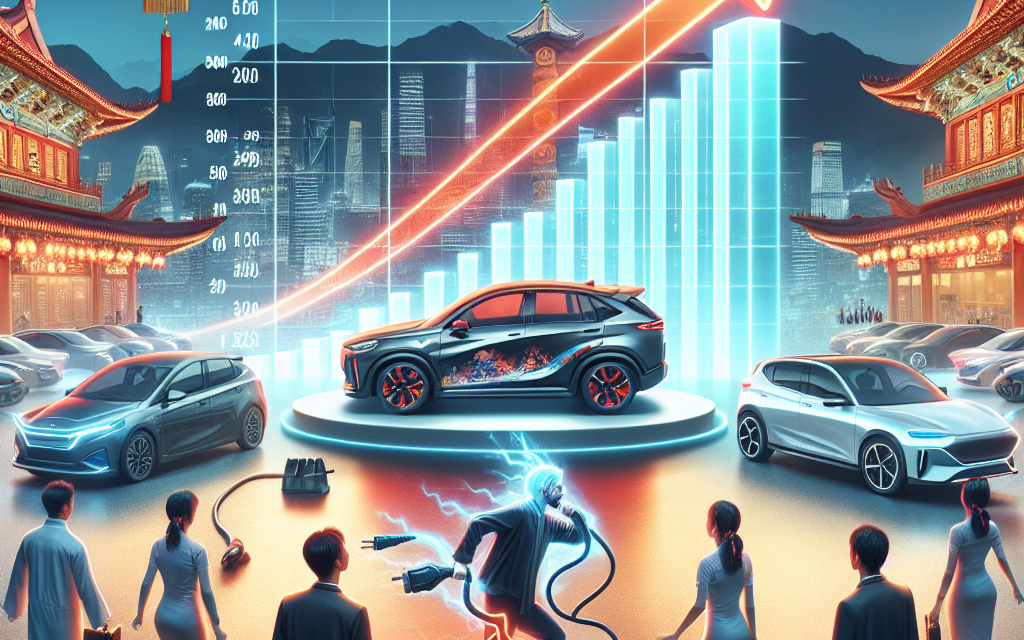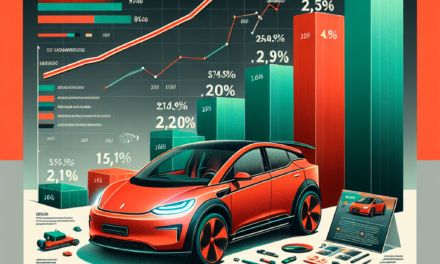“China’s Electric Revolution: Surge in EV Sales as Gasoline Vehicles Fade in 2024.”
Introduction
In 2024, China is witnessing a remarkable surge in electric car sales, marking a significant shift in the automotive landscape as gasoline vehicle sales continue to decline. This transition is driven by a combination of government policies promoting green energy, advancements in battery technology, and increasing consumer awareness of environmental issues. As urban centers prioritize sustainability and infrastructure for electric vehicles expands, the demand for electric cars is outpacing traditional gasoline vehicles. This trend not only reflects changing consumer preferences but also positions China as a global leader in the electric vehicle market, reshaping the future of transportation.
Electric Car Market Growth in China
In 2024, the electric car market in China has experienced a remarkable surge, reflecting a significant shift in consumer preferences and government policies aimed at promoting sustainable transportation. This growth is particularly noteworthy as it coincides with a decline in gasoline vehicle sales, indicating a transformative moment in the automotive industry. The increasing adoption of electric vehicles (EVs) can be attributed to several interrelated factors, including advancements in technology, enhanced infrastructure, and a growing awareness of environmental issues.
One of the primary drivers of this growth is the rapid advancement in battery technology, which has led to improvements in the range, performance, and affordability of electric vehicles. Manufacturers are investing heavily in research and development to produce batteries that not only last longer but also charge more quickly. As a result, consumers are increasingly finding electric cars to be a viable alternative to traditional gasoline vehicles. This technological evolution has also contributed to a decrease in the overall cost of EVs, making them more accessible to a broader segment of the population.
Moreover, the Chinese government has played a pivotal role in fostering the electric vehicle market through a series of supportive policies and incentives. These measures include substantial subsidies for EV purchases, tax exemptions, and investments in charging infrastructure. The government’s commitment to reducing carbon emissions and combating air pollution has further propelled the shift towards electric mobility. As cities grapple with the challenges of urban air quality, the promotion of electric vehicles has become a key component of national and local strategies aimed at creating cleaner environments.
In addition to government support, the expansion of charging infrastructure has significantly alleviated concerns regarding the practicality of owning an electric vehicle. The establishment of widespread charging stations across urban and rural areas has made it increasingly convenient for consumers to transition from gasoline vehicles to electric ones. This infrastructure development not only enhances the user experience but also builds consumer confidence in the reliability of electric vehicles. As charging stations become more ubiquitous, the range anxiety that once deterred potential buyers is gradually dissipating.
Furthermore, the growing awareness of environmental issues among consumers has also contributed to the rise in electric vehicle sales. As climate change becomes an increasingly pressing global concern, many individuals are seeking ways to reduce their carbon footprint. Electric vehicles are often perceived as a more sustainable option, aligning with the values of environmentally conscious consumers. This shift in mindset is particularly evident among younger generations, who are more inclined to prioritize sustainability in their purchasing decisions.
As electric vehicle sales continue to rise, traditional gasoline vehicle manufacturers are feeling the impact of this transition. Many are now pivoting their strategies to include electric models in their lineups, recognizing the need to adapt to changing consumer preferences. This competitive landscape is likely to accelerate innovation and drive further advancements in electric vehicle technology, ultimately benefiting consumers.
In conclusion, the surge in electric car sales in China in 2024 marks a significant turning point in the automotive industry, characterized by a decline in gasoline vehicle sales. This transformation is driven by technological advancements, supportive government policies, expanded charging infrastructure, and a heightened awareness of environmental issues. As these trends continue to evolve, the electric vehicle market in China is poised for sustained growth, reshaping the future of transportation in the country and beyond.
Factors Driving Electric Vehicle Adoption
The surge in electric car sales in China, coupled with the decline in gasoline vehicle sales in 2024, can be attributed to a confluence of factors that are reshaping the automotive landscape. One of the primary drivers of this shift is the increasing awareness of environmental issues among consumers. As climate change becomes an ever-pressing concern, many individuals are seeking sustainable alternatives to traditional gasoline-powered vehicles. This growing consciousness has led to a heightened demand for electric vehicles (EVs), which are perceived as a cleaner and more environmentally friendly option.
In addition to consumer awareness, government policies and incentives play a crucial role in promoting electric vehicle adoption. The Chinese government has implemented a range of initiatives aimed at reducing carbon emissions and encouraging the use of EVs. These measures include substantial subsidies for electric car buyers, tax exemptions, and investments in charging infrastructure. By making electric vehicles more financially accessible, the government is effectively stimulating demand and facilitating a smoother transition from gasoline vehicles to electric alternatives.
Moreover, advancements in technology have significantly enhanced the appeal of electric vehicles. Battery technology, in particular, has seen remarkable improvements, resulting in longer ranges and shorter charging times. As manufacturers continue to innovate, the performance of electric cars is increasingly comparable to that of traditional vehicles. This technological evolution not only addresses consumer concerns regarding range anxiety but also enhances the overall driving experience, making EVs a more attractive option for a broader audience.
Furthermore, the growing availability of diverse electric vehicle models has contributed to the surge in sales. In the past, consumers often faced limited choices when it came to electric cars, which may have deterred potential buyers. However, as automakers expand their electric offerings, consumers now have access to a wider range of models that cater to various preferences and budgets. This diversification allows buyers to select vehicles that align with their lifestyle needs, further driving the shift towards electric mobility.
In addition to these factors, the rising cost of gasoline has also influenced consumer behavior. As fuel prices continue to fluctuate, many drivers are reevaluating their transportation options. Electric vehicles, with their lower operating costs and reduced reliance on fossil fuels, present a financially viable alternative. This economic consideration, combined with the environmental benefits of EVs, has prompted many consumers to make the switch, thereby accelerating the decline of gasoline vehicle sales.
Moreover, the increasing presence of electric vehicle manufacturers in the market has intensified competition, leading to improved quality and affordability. Established automakers are investing heavily in electric vehicle development, while new entrants are challenging traditional players with innovative designs and competitive pricing. This dynamic environment fosters a sense of urgency among manufacturers to enhance their offerings, ultimately benefiting consumers through better products and services.
In conclusion, the factors driving electric vehicle adoption in China are multifaceted and interconnected. From heightened environmental awareness and supportive government policies to technological advancements and economic considerations, each element plays a significant role in shaping consumer preferences. As the landscape continues to evolve, it is evident that electric vehicles are not merely a passing trend but rather a fundamental shift in the way people approach transportation. This transformation is likely to have lasting implications for the automotive industry and the environment as a whole.
Impact of Government Policies on EV Sales
The surge in electric vehicle (EV) sales in China, juxtaposed with the decline in gasoline vehicle sales in 2024, can be largely attributed to a series of government policies aimed at promoting sustainable transportation. These policies have not only incentivized consumers to make the switch to electric vehicles but have also fostered an environment conducive to the growth of the EV market. As the Chinese government continues to prioritize environmental sustainability and energy efficiency, the impact of these policies becomes increasingly evident.
One of the most significant measures implemented by the Chinese government is the provision of substantial subsidies for electric vehicle purchases. These financial incentives have made EVs more accessible to a broader segment of the population, effectively lowering the initial cost barrier that often deters potential buyers. Furthermore, the government has established a framework of tax exemptions and reductions for electric vehicle owners, which enhances the overall appeal of EVs compared to traditional gasoline vehicles. As a result, consumers are more inclined to consider electric options, leading to a marked increase in sales.
In addition to direct financial incentives, the Chinese government has also invested heavily in the development of charging infrastructure. The expansion of charging stations across urban and rural areas has alleviated concerns regarding range anxiety, a common apprehension among potential electric vehicle buyers. By ensuring that charging facilities are readily available, the government has made it more convenient for consumers to transition to electric vehicles. This strategic investment not only supports current EV owners but also encourages prospective buyers to embrace electric mobility, further driving sales.
Moreover, the government has implemented stringent regulations aimed at reducing carbon emissions from the automotive sector. These regulations include stricter fuel economy standards and emissions targets for gasoline vehicles, which have prompted manufacturers to pivot towards electric vehicle production. As automakers respond to these regulatory pressures, they are increasingly investing in research and development to enhance the performance and affordability of electric vehicles. Consequently, the market is flooded with a diverse range of EV options, catering to various consumer preferences and needs, which in turn stimulates sales.
The promotion of electric vehicles is also reflected in the government’s long-term strategic plans, such as the “Made in China 2025” initiative, which emphasizes the importance of innovation and sustainability in the automotive industry. By positioning electric vehicles as a cornerstone of future transportation, the government is not only shaping consumer behavior but also encouraging manufacturers to prioritize EV technology. This forward-thinking approach has led to a rapid evolution in electric vehicle design and functionality, making them increasingly attractive to consumers.
Furthermore, public awareness campaigns have played a crucial role in shifting consumer perceptions regarding electric vehicles. The government has actively promoted the environmental benefits of EVs, highlighting their role in reducing air pollution and combating climate change. As public consciousness around environmental issues grows, consumers are more likely to consider the ecological impact of their vehicle choices, leading to a greater inclination towards electric vehicles.
In conclusion, the remarkable surge in electric vehicle sales in China, coupled with the decline in gasoline vehicle sales in 2024, can be largely attributed to the comprehensive and strategic government policies that have been implemented. Through financial incentives, infrastructure development, regulatory measures, and public awareness campaigns, the Chinese government has effectively created a favorable environment for electric vehicles. As these policies continue to evolve, they are likely to further solidify China’s position as a global leader in the electric vehicle market.
Comparison of Electric and Gasoline Vehicle Sales
In 2024, the automotive landscape in China has undergone a significant transformation, marked by a pronounced surge in electric vehicle (EV) sales juxtaposed against a decline in gasoline vehicle sales. This shift is not merely a fleeting trend but rather a reflection of broader societal changes, technological advancements, and government policies aimed at promoting sustainable transportation. As consumers increasingly gravitate towards electric vehicles, the implications for the automotive industry and the environment are profound.
To begin with, the statistics surrounding vehicle sales in China paint a compelling picture. In the first quarter of 2024, electric vehicle sales soared by over 30% compared to the same period in the previous year, while gasoline vehicle sales experienced a notable decline of approximately 15%. This stark contrast highlights a pivotal moment in the automotive sector, where electric vehicles are no longer seen as niche products but rather as mainstream options for consumers. The growing acceptance of EVs can be attributed to several factors, including advancements in battery technology, increased range, and a more extensive charging infrastructure that alleviates concerns about range anxiety.
Moreover, the Chinese government has played a crucial role in this transition by implementing policies that favor electric vehicles. Subsidies for EV purchases, investments in charging stations, and stringent emissions regulations for gasoline vehicles have collectively incentivized consumers to make the switch. As a result, many consumers are now more inclined to consider electric vehicles not only for their environmental benefits but also for their long-term cost savings. The lower operating costs associated with electric vehicles, including reduced fuel expenses and lower maintenance requirements, further enhance their appeal in a market that is increasingly price-sensitive.
In addition to government support, the automotive industry itself has responded to changing consumer preferences by ramping up the production of electric vehicles. Major manufacturers have invested heavily in research and development to create a diverse range of EV models that cater to various consumer needs, from compact cars to luxury sedans and SUVs. This diversification has made electric vehicles more accessible to a broader audience, thereby accelerating their adoption. Furthermore, as more consumers experience the benefits of electric vehicles firsthand, word-of-mouth recommendations and positive reviews contribute to a growing perception of EVs as reliable and desirable options.
Transitioning from gasoline to electric vehicles also has significant environmental implications. The reduction in gasoline vehicle sales is expected to lead to a decrease in greenhouse gas emissions, contributing to improved air quality in urban areas. As cities grapple with pollution and climate change, the shift towards electric vehicles represents a critical step in achieving sustainability goals. Additionally, the increased demand for electric vehicles has spurred innovation in renewable energy sources, as the need for clean electricity to power these vehicles becomes more pressing.
In conclusion, the comparison of electric and gasoline vehicle sales in China in 2024 reveals a clear trend towards electrification. The surge in electric vehicle sales, driven by consumer demand, government policies, and industry innovation, stands in stark contrast to the decline in gasoline vehicle sales. This shift not only signifies a change in consumer preferences but also reflects a broader commitment to sustainability and environmental responsibility. As the automotive industry continues to evolve, the implications of this transition will resonate far beyond the marketplace, shaping the future of transportation in China and beyond.
Consumer Preferences Shifting Towards EVs
In recent years, the automotive landscape in China has undergone a significant transformation, marked by a pronounced shift in consumer preferences from traditional gasoline vehicles to electric vehicles (EVs). This trend has become particularly evident in 2024, as sales data reveals a remarkable surge in electric car purchases, coinciding with a notable decline in gasoline vehicle sales. Several factors contribute to this evolving consumer behavior, reflecting broader societal changes, technological advancements, and government policies aimed at promoting sustainable transportation.
One of the primary drivers behind the increasing popularity of electric vehicles is the growing awareness of environmental issues among Chinese consumers. As concerns about air pollution and climate change intensify, many individuals are seeking ways to reduce their carbon footprint. Electric vehicles, which produce zero tailpipe emissions, present an appealing alternative to gasoline-powered cars. Consequently, consumers are increasingly prioritizing sustainability in their purchasing decisions, leading to a heightened demand for EVs. This shift is not merely a trend but rather a reflection of a deeper commitment to environmental stewardship among the populace.
Moreover, advancements in battery technology have significantly enhanced the appeal of electric vehicles. With improvements in battery efficiency and charging infrastructure, consumers are now more confident in the practicality of owning an EV. The range anxiety that once plagued potential buyers has diminished, as many new electric models offer competitive ranges comparable to their gasoline counterparts. Additionally, the expansion of charging networks across urban and rural areas has made it more convenient for consumers to charge their vehicles, further encouraging the transition to electric mobility. As a result, the perception of electric vehicles as a viable and convenient option has solidified, leading to increased sales.
Government policies also play a crucial role in shaping consumer preferences. The Chinese government has implemented a range of incentives to promote electric vehicle adoption, including subsidies, tax breaks, and favorable licensing regulations. These measures not only make EVs more financially accessible but also signal a strong commitment to fostering a green economy. As consumers become aware of these incentives, they are more likely to consider electric vehicles as a practical choice. Furthermore, the government’s ambitious targets for reducing carbon emissions and promoting clean energy have created a sense of urgency among consumers to align their purchasing decisions with national goals.
In addition to environmental and economic factors, the evolving landscape of automotive technology has captured the attention of consumers. The integration of advanced features such as autonomous driving capabilities, smart connectivity, and enhanced safety systems in electric vehicles has made them increasingly attractive. Consumers are drawn to the innovative aspects of EVs, which often come equipped with cutting-edge technology that enhances the driving experience. This technological allure, combined with the environmental benefits, has led to a growing segment of the population that actively seeks out electric vehicles.
As the year 2024 progresses, it is clear that consumer preferences in China are shifting decisively towards electric vehicles. The convergence of environmental awareness, technological advancements, supportive government policies, and the allure of innovation has created a fertile ground for the growth of the electric vehicle market. Consequently, as gasoline vehicle sales decline, the rise of electric cars signifies not only a change in consumer behavior but also a broader societal shift towards sustainable transportation solutions. This evolution in the automotive sector reflects a commitment to a cleaner, greener future, positioning China as a leader in the global transition to electric mobility.
Technological Advancements in Electric Vehicles
The surge in electric car sales in China, coupled with the decline in gasoline vehicle sales in 2024, can be attributed to a myriad of technological advancements that have significantly enhanced the appeal and practicality of electric vehicles (EVs). As the automotive industry evolves, innovations in battery technology, charging infrastructure, and vehicle design have played pivotal roles in transforming consumer perceptions and driving adoption rates.
One of the most notable advancements is in battery technology, particularly the development of lithium-ion batteries with higher energy densities. These batteries not only provide longer ranges on a single charge but also improve the overall efficiency of electric vehicles. As manufacturers invest in research and development, breakthroughs such as solid-state batteries are on the horizon, promising even greater energy storage capabilities and faster charging times. This progress alleviates one of the primary concerns consumers have had regarding electric vehicles: range anxiety. With the ability to travel longer distances without frequent recharging, potential buyers are increasingly willing to consider EVs as viable alternatives to traditional gasoline-powered cars.
In addition to battery improvements, the expansion of charging infrastructure has been instrumental in facilitating the transition to electric vehicles. The Chinese government has made significant investments in the development of charging stations across urban and rural areas, ensuring that EV owners have convenient access to charging facilities. This extensive network not only supports current electric vehicle users but also encourages prospective buyers by addressing concerns about the availability of charging options. Furthermore, advancements in fast-charging technology have reduced the time required to recharge an electric vehicle, making it more comparable to the time it takes to refuel a gasoline car. As a result, the convenience factor associated with electric vehicles continues to improve, further driving consumer interest.
Moreover, the integration of smart technology into electric vehicles has enhanced their functionality and user experience. Features such as advanced driver-assistance systems (ADAS), connectivity options, and over-the-air software updates have made electric cars more appealing to tech-savvy consumers. These innovations not only improve safety and convenience but also provide a more engaging driving experience. As automakers incorporate artificial intelligence and machine learning into their vehicles, the potential for personalized driving experiences and enhanced vehicle performance becomes increasingly feasible. This technological integration aligns with the preferences of modern consumers, who often seek vehicles that offer both practicality and cutting-edge features.
Additionally, the environmental benefits associated with electric vehicles cannot be overlooked. As awareness of climate change and air pollution grows, consumers are becoming more conscious of their carbon footprints. Electric vehicles, which produce zero tailpipe emissions, present a compelling alternative to gasoline vehicles, particularly in urban areas where air quality is a significant concern. The combination of technological advancements and environmental consciousness has created a favorable climate for electric vehicle adoption in China, leading to a marked increase in sales.
In conclusion, the surge in electric car sales in China amid the decline of gasoline vehicle sales in 2024 is a testament to the profound impact of technological advancements in the automotive sector. From improved battery technology and expanded charging infrastructure to the integration of smart features and a growing awareness of environmental issues, these developments have collectively transformed the landscape of personal transportation. As the industry continues to innovate, it is likely that electric vehicles will play an increasingly dominant role in the future of mobility, reshaping consumer preferences and driving sustainable practices in the automotive market.
Future Trends in China’s Automotive Industry
As the automotive landscape in China continues to evolve, the surge in electric car sales juxtaposed with the decline in gasoline vehicle sales marks a significant shift in consumer preferences and industry dynamics. This transformation is not merely a fleeting trend; rather, it reflects broader societal changes, technological advancements, and government policies aimed at promoting sustainable transportation. In 2024, the implications of this shift are becoming increasingly evident, as electric vehicles (EVs) gain traction among consumers and manufacturers alike.
One of the primary drivers of this transition is the Chinese government’s commitment to reducing carbon emissions and combating air pollution. With ambitious targets set for carbon neutrality by 2060, the government has implemented a range of incentives to encourage the adoption of electric vehicles. These incentives include subsidies for EV purchases, investments in charging infrastructure, and stringent regulations on gasoline vehicle production. As a result, consumers are increasingly drawn to electric cars, which are perceived as not only environmentally friendly but also economically advantageous in the long run.
Moreover, advancements in battery technology have significantly enhanced the appeal of electric vehicles. The development of more efficient and longer-lasting batteries has alleviated concerns regarding range anxiety, a common barrier to EV adoption. As manufacturers continue to innovate, the performance and affordability of electric cars are improving, making them a viable alternative to traditional gasoline vehicles. Consequently, consumers are more willing to invest in electric cars, leading to a notable increase in sales figures.
In addition to government support and technological advancements, changing consumer attitudes play a crucial role in shaping the future of China’s automotive industry. Younger generations, in particular, are more environmentally conscious and prioritize sustainability in their purchasing decisions. This demographic shift is prompting automakers to adapt their strategies, focusing on electric vehicle production to meet the evolving demands of the market. As a result, traditional manufacturers are increasingly investing in electric vehicle research and development, while new players are entering the market with innovative offerings.
Furthermore, the competitive landscape is becoming more dynamic as established automotive giants and startups alike vie for market share in the electric vehicle sector. This competition is fostering innovation and driving down prices, making electric cars more accessible to a broader audience. As a consequence, the decline in gasoline vehicle sales is expected to accelerate, as consumers recognize the long-term benefits of transitioning to electric mobility.
Looking ahead, the future trends in China’s automotive industry suggest a continued emphasis on sustainability and technological innovation. The integration of smart technologies, such as autonomous driving and connected vehicle systems, is likely to further enhance the appeal of electric vehicles. As these technologies mature, they will not only improve the driving experience but also contribute to the overall efficiency of transportation systems.
In conclusion, the surge in electric car sales in China, coupled with the decline in gasoline vehicle sales, signals a pivotal moment in the automotive industry. This transformation is driven by a confluence of government policies, technological advancements, and shifting consumer preferences. As the market continues to evolve, it is clear that electric vehicles will play a central role in shaping the future of transportation in China, paving the way for a more sustainable and innovative automotive landscape. The implications of this shift extend beyond the automotive sector, influencing broader economic and environmental trends that will define the coming decades.
Q&A
1. **Question:** What is the primary reason for the surge in electric car sales in China in 2024?
**Answer:** The primary reason is the increasing government incentives and subsidies for electric vehicles, along with a growing consumer preference for environmentally friendly options.
2. **Question:** How much did electric vehicle sales increase in China in 2024 compared to the previous year?
**Answer:** Electric vehicle sales in China increased by approximately 30% in 2024 compared to 2023.
3. **Question:** What impact has the decline in gasoline vehicle sales had on the automotive market in China?
**Answer:** The decline in gasoline vehicle sales has led to a significant shift in the automotive market, with manufacturers focusing more on electric vehicle production and innovation.
4. **Question:** Which segment of electric vehicles saw the most growth in 2024?
**Answer:** The segment of battery electric vehicles (BEVs) saw the most growth, accounting for the majority of electric vehicle sales.
5. **Question:** What role do charging infrastructure developments play in the rise of electric vehicle sales?
**Answer:** The expansion of charging infrastructure has made electric vehicles more convenient for consumers, significantly contributing to the rise in sales.
6. **Question:** How are traditional automakers responding to the decline in gasoline vehicle sales?
**Answer:** Traditional automakers are increasingly investing in electric vehicle technology and transitioning their production lines to focus on electric models.
7. **Question:** What environmental impact is associated with the shift from gasoline vehicles to electric vehicles in China?
**Answer:** The shift is expected to reduce greenhouse gas emissions and improve air quality, contributing positively to environmental sustainability efforts in China.
Conclusion
In 2024, the surge in electric car sales in China, driven by government incentives, advancements in battery technology, and increasing consumer awareness of environmental issues, has significantly outpaced the decline in gasoline vehicle sales. This shift reflects a broader transition towards sustainable transportation, positioning China as a global leader in the electric vehicle market and indicating a pivotal change in consumer preferences and regulatory landscapes. The decline in gasoline vehicle sales underscores the urgency for traditional automakers to adapt to this evolving market or risk obsolescence.





